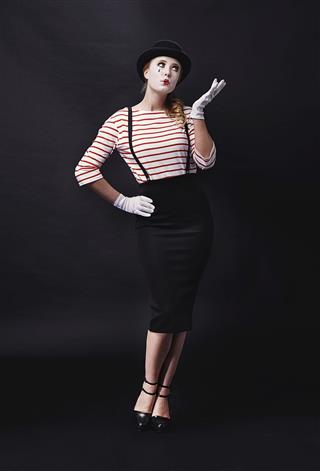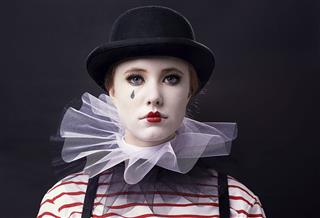
Acting is an opportunity to explore yourself deeply and challenge your inhibitions. The acting theory proposed here, known by the name of method acting, is credited to Constantin Stanislavski, the great Russian actor and director. Over the time many art lovers, artists and actors have come up with interesting and helpful acting tips for beginners.
Acting, for me, is letting go of myself for a while and become somebody who I will never be. It is like living an alternate life for a brief period of time. It is an opportunity to conquer all my inhibitions, conditioned by society and release myself from them. This Entertainism article has some acting tips for beginners from my study and experience of ‘Method Acting’ or ‘Realistic Acting’, an acting theory, which is based on realistic imagination. The acting principles are based on Stanislavski’s theoretical treatise, on method acting called ‘An Actor Prepares‘, which is recommended reading for any serious student of theater and acting. By nature acting is a ‘Performing‘ art and ergo, to understand it theoretically is not learning it, just as there is a difference between knowing the path and actually walking the path. Don’t consider yourself a student of acting till you actually begin to ‘act’. Only believe in what I share here, if you find it to be true through your own experience.
Method Acting Tips For Beginners
“If your mind is empty, it is always ready for anything, it is open to everything. In the beginner’s mind there are many possibilities, but in the expert’s mind there are few. ” – Shunryu Suzuki
As the zen masters say, if you try to fill a cup, which is already full, it will all spill over. To fill something new in a cup, first it must be emptied. So, the tips for beginners that I share here, will have an effect, if you give it an unbiased thought. Read and consider the acting tips and tricks, given here, apply them and then judge them. These are tips from master theater artists, compiled by me. Look at things from the beginner’s mind.
What I talk about here is mostly acting in theater, which is the most real and challenging type of acting, according to me. That doesn’t mean, acting in front of the camera is inferior, but there you have the convenience of a ‘retake’. There are no retakes in theater, as in life. You are there and in the now and the measure of your acting prowess is measured by how sincerely you offer yourself to that moment.
No Fear!
“Do the thing you fear most and the death of fear is certain.“
– Mark Twain
First part is dealing with stage fright of course. To deal with it and forget it, concentrate on your role and think about nothing else. Learn to enjoy the spotlight and just do what you need to do! With every outing on-stage you will get better at handling it. A little stage fright will always remain and keep you alert on stage.
Beware of Overacting or Mechanical Acting
“Never allow yourself externally to portray anything that you have not inwardly experienced and which is not even interesting to you. A character built on stereotype cannot grow.”
– Constantin Stanislavski
A warning right at the beginning. What separates good actors from bad ones is their sincerity of emotion and belief on the stage. Audience can spot a phony right away! Good acting is not over acting or mechanically saying lines. It is not reading out lines! Do not say or do anything on stage or on screen, without understanding what you are saying. Do not say anything, unless you understand the emotion that evokes the dialog. Words flow, when emotions evoke them out of memory and it’s not the other way round. Feel the emotion, connect with it, embrace it and words will then flow naturally.
Acting is all about Belief and Creative Imagination
“The actor must use his imagination to be able to answer all questions (when, where, why, how). Make the make-believer existence more definite.“
– Constantin Stanislavski
Acting is living an alternate life, as I said before. It is ‘make believe‘. The audience is only going to believe that you are the person you are playing to be, if you yourself believe that you are that person! To arrive from being who you are in reality, to who you are on stage, is a process which you have to go through. The thing that is going to get you there is creative imagination and belief!
An Actor Must be An Athlete Philosopher
“The actor has to develop his body. The actor has to work on his voice. But the most important thing the actor has to work on is his mind.“
– Stella Adler
An actor must cultivate his mind and body as an instrument in portraying roles. His mind needs to be able to grasp things, as astutely as a philosopher and his body must be able to portray a range of emotions. Acting is about harnessing the mind-body connection. You need to mindfully enter the character you play and you will be there bodily. The athlete is all about action, motivated by emotion and the philosopher is all about thought. An actor must walk the middle path between the athlete and the philosopher. He shouldn’t be so carried away by emotions, that reason eludes him, nor should he be so overwhelmed by thought, that emotions stop flowing naturally. Achieving this inner balance is paramount, when acting.
Read and Understand the Script
“In the creative process there is the father, the author of the play; the mother, the actor pregnant with the part; and the child, the role to be born.“
– Constantin Stanislavski
Read the script thoroughly. Then read it and once you are done, read it yet again. Keep reading till you get from the skin to the soul of the story. Understand the script first and think about what the playwright has tried to say through the script. This a view from the outside. Then again read the story from the perspective of the role you are playing. Discuss with the director about what exactly you feel about the story and clarify your doubts. This is very important, as you need to understand the people, the surroundings, the time of the story and its message.
Know Everything about the Role and the Person
“The life of a character should be an unbroken line of events and emotions, but a play only gives us a few moments on that line – we must create the rest to portray a convincing life.“
– Constantin Stanislavski
Next step is to know as much as you can about the role you are portraying, in explicit details. You must ask questions about the role. Who is that person? Where does he come from? The answer to these questions will be partly found in the outlines of the play and partly out of your own creative imagination! Research the script as much as you can, to know your role! Some actors even write a diary of a day, in the life of that character! You must know him/her like the back of your hand. Even if the details of the character come from your imagination, and only partly from the script, they must be very specific.
Then, slowly, you will get an idea about how this person might be thinking. You will know why he reacts the way he does in the particular situations of a play. You will get an idea about the rationale behind the character’s behavior. Understand his philosophy about life and his super objective. This is your homework.
What makes the person, that is you, is a superposition of millions of memories, biases and impressions. To become the person you’re going to portray, you have to create and connect with the psyche that makes him or her. Consider his presence in the play as just a snapshot of his life and let him grow beyond that snapshot, into the past and the future. Flesh out a person out of that role, who has his likes and dislikes, his apprehensions, his rules and his defining experiences. Live his life till you understand what makes that character and who he is!
Connect to the Role through Emotional Memory
Acting is not about being someone different. It’s finding the similarity in what is apparently different, then finding myself in there.
– Meryl Streep
Now, you exactly know who you are going to portray! Next part is being him/her! It is the easiest and the most difficult part. Learn the dialogs of the play thoroughly and understand the mood of the character when he/she says them.
Draw parallels between the character’s life and your own experiences from your emotional memory! Emotional memory is the parallel memory that you have stored inside you, through which you can relate to that character! Invoke your emotional memory when you say the dialogs as that person. Slowly, you will not just sympathize with the character, you will empathize! You will start thinking the way he/she thinks, feels. Once you get that character, all your body language, your toning will fall in place accordingly! In all this process, the director will aid you. Then you can polish other minor details like your positioning on stage, your entry and exit cues and all the other mechanical things that must be remembered.
It is all about Concentration and Practice
“Remember: there are no small parts, only small actors.“
– Constantin Stanislavski
Once you start getting the role, you need to practice and rehearse it regularly. To get into the role on stage and make other people believe that you are him, you must concentrate and cultivate your imagination onstage. You must be able to see what the character sees! With each rehearsal, try to see more deeply and let the character take control.
Lose Yourself in the Role but Stay Aware
“I regard the theater as the greatest of all art forms, the most immediate way in which a human being can share with another the sense of what it is to be a human being.“
– Oscar Wilde
On a character level you must be involved, but your awareness as an actor should also be there, all the time, while performing. There are certain subtleties about presenting a character and performing on stage. There is a limit to how much realism you can bring on stage. There are some things which you need to modify, so that it is presentable on stage. While playing the role, in the flow of character, one has to be aware as an actor of all those subtleties.
Empathize
“Could a greater miracle take place than for us to look through each other’s eye for an instant?
– Henry David Thoreau
One of the most important qualities that great actors have possessed is the ability to empathize. To perceive the complexities, contradictions, agony and bliss of the person behind the character, you need to empathize with him. Empathy is the key to understanding a person and the door through which you enter into the psyche of your character, to portray him and interpret him your way.
Enjoy the Process
“Success is transient, evanescent. The real passion lies in the poignant acquisition of knowledge about all the shading and subtleties of the creative secrets.“
– Constantin Stanislavski
Last but not the least, to do it right, you must enjoy the process! A very important part is bonding with your co-actors and developing good chemistry on stage. A play is a team job and you need to be a team player. The success of a role or a play is directly proportional to how much the team enjoyed while preparing! Keep learning and always have the passion of a beginner’s mind and you will never cease to progress.
No other art helps you overcome your own self like acting. It is the most ‘alive’ form of art, which explores the deep labyrinths of the mystery, that is human mind. Remember, learning to be a good actor is synonymous with learning to be a good human being!









